June 4, 2021, marked the 32nd anniversary of the Chinese Communist Party’s putting down peaceful demonstrations at Tiananmen Square by force. The scene of one lone protester, armed with nothing but shopping bags while facing a row of People’s Liberation Army tanks, is one of the twentieth century’s most iconic images. China has consistently censored information on the Chinese mainland about the events at Tiananmen Square in 1989. On June 4, 2021, users around the world in countries including the United States, Germany, and Singapore noted that Microsoft’s Bing search engine was censoring search results for “tank man” – which would ordinarily return images from the 1989 protest. Bing acknowledged the “error” and has since taken steps to rectify it. In this post, I will examine Bing’s pro-CCP censorship and what it means for alternative search engines that license Bing’s search index.

(Note: I took clipped all screenshots in this article from my Ungoogled Chromium web browser on the afternoon of June 4, 2021.)
Bing’s Tiananmen Square Censorship on Behalf of the Chinese Communist Party
Multiple outlets reported on Bing’s censoring image search results for “tank man” outside of China. Below, you will find three examples:
- Bing Censors Image Search for ‘Tank Man’ Even in US (Vice)
- Microsoft blames human error after Bing censors images of Tiananmen Square ‘tank man’ protest (Independent)
- Microsoft Blames ‘Human Error’ Amid Suspicion It Censored Bing Results for Tiananmen Square ‘Tank Man’ (Gizmodo)
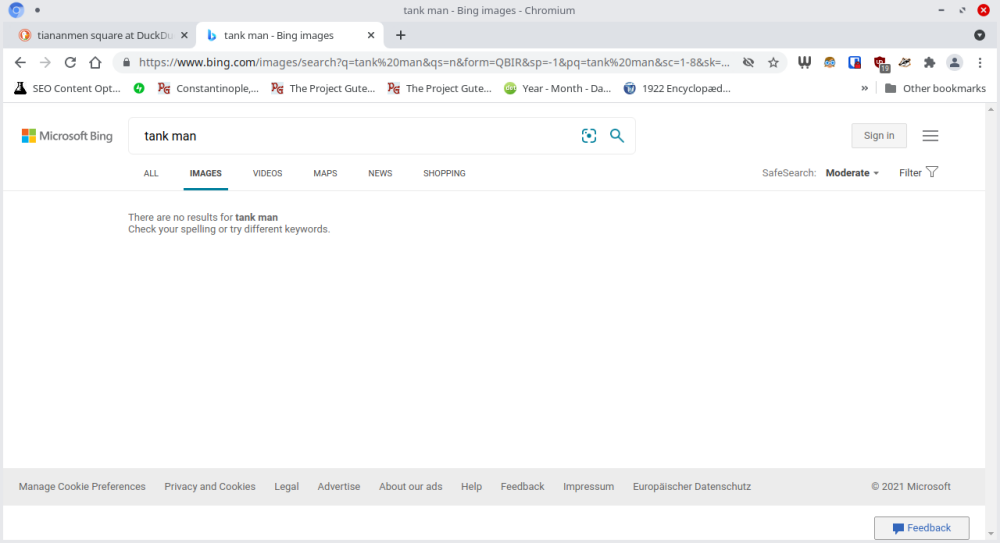
A friend alerted me to the story early on June 4, before most of the reports came out. To begin, the problem only affected Bing’s image and video search results. A regular search on Bing returned ordinary results. Image searches for specific terms related to the Tiananmen Square protests returned censored results.
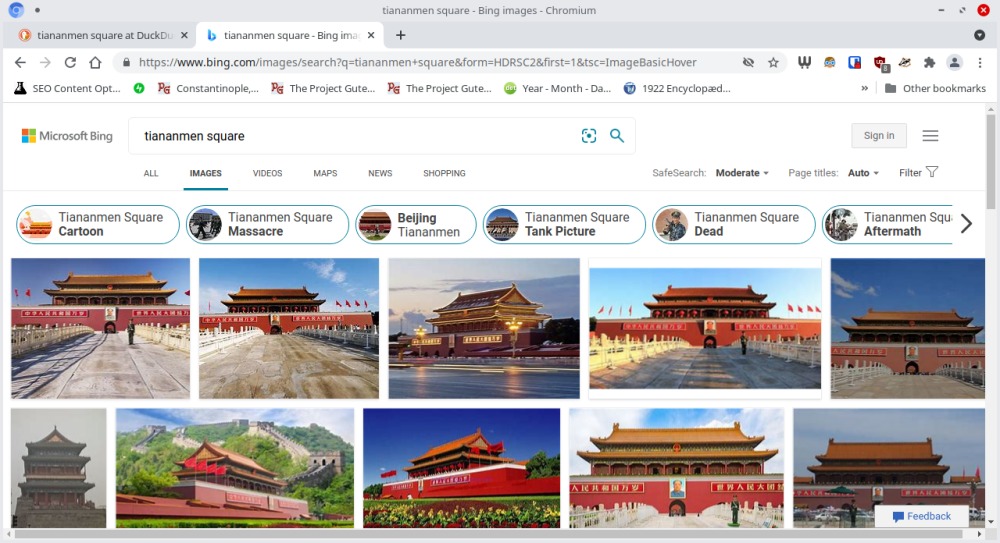
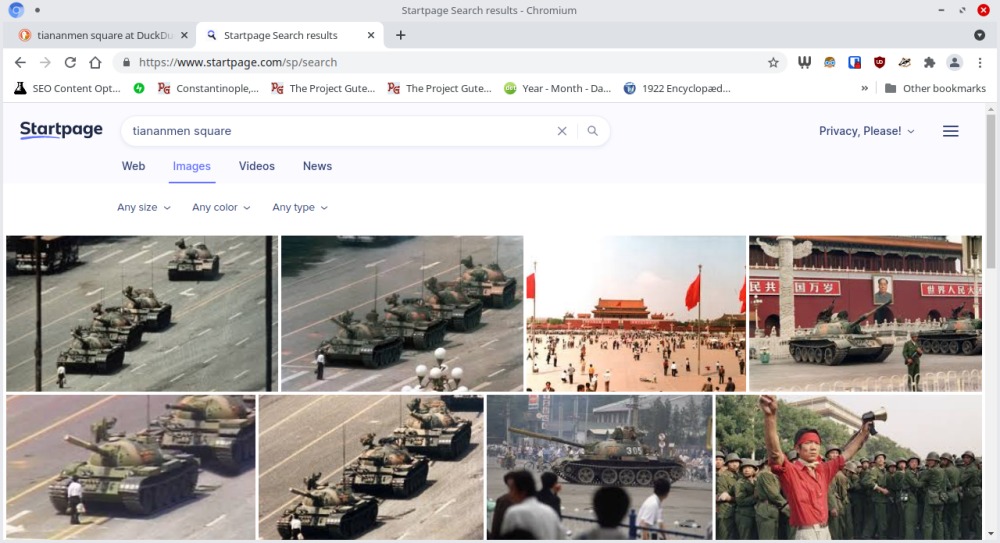
I tested various search terms and found that the problem extended beyond a specific search for “tank man.” Bing, and search engines that license Bing’s search results, returned censored image results for a number of queries relating to the Tiananmen Square protests. Furthermore, I performed searches with a Switzerland IP address and the various search engines configured to Switzerland and received the same censored results.
Bing blamed the censorship on “human error.” One interesting note is that Google did not censor image results relating to Tiananmen Square. Below, I will explore both of these issues.
Bing’s “Human Error”
Bing insists that its pro-Chinese Communist Party censorship was “human error.” Is this plausible? I think that it is to a point. Unlike Google, Bing is allowed to operate in China. I will note that The New Leaf Journal has on occasion received visitors from the Chinese version of Bing. Bing was the third most-used search engine in China in May 2021 behind two Chinese search engines, commanding a 2.51% market share.
In order to operate in China, Microsoft must kowtow to the Chinese Communist Party. That, of course, means censoring search results at the behest of the Chinese Communist Party. It seems likely that Bing applied its Chinese search engine rules worldwide. Whether this was “human error” or something more is not yet known. In light of the sacrifices that Microsoft already makes to appease the powers that be in China, I do not see a need to take their word for why the censorship occurred without a detailed explanation of how such a comprehensive human error was committed.
That Bing likely elected to apply its China rules outside of China may help explain why we did not see similar censorship on Google. While I have documented Google’s own cases of pro-Chinese government censorship, it does not appear to have the same reason as Bing to censor results related to the Tiananmen Square protests.
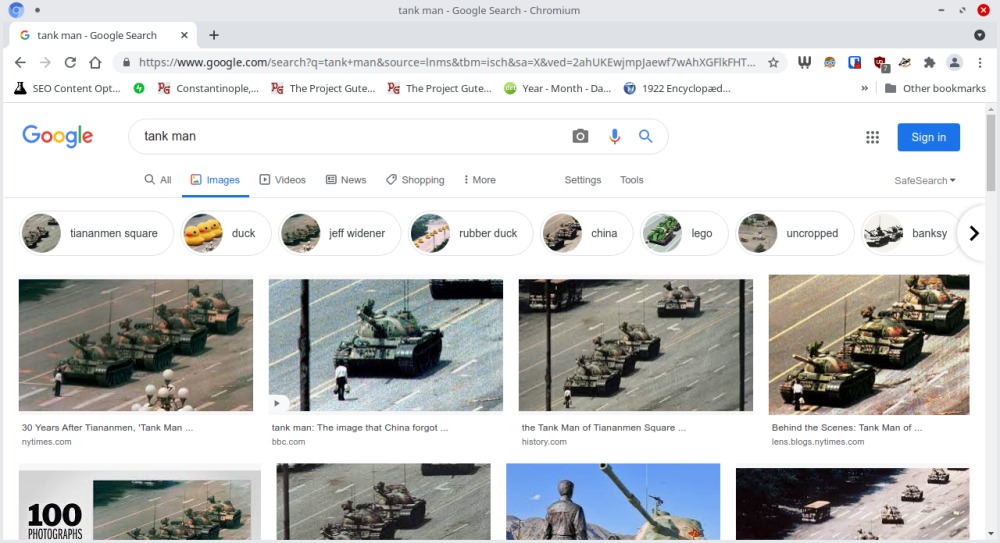
The Effect of Bing’s Chinese Government Censorship on Alternative Search Engines
I do not often use Google or Bing to perform web searches. Instead, as I discussed in my review of the Wutsearch search engine launchpad, I use a variety of alternative, privacy-friendly search engines. These search engines, to varying degrees, treat users as users rather than as products. In the final section of my Wutsearch search engine launchpad review (see “Wutsearch Search Engines to Try”), I recommended trying seven of Wutsearch’s alternative search engines. Five of these search engines – DuckDuckGo, Qwant, Swisscows, Ecosia, and Peekier – rely heavily on Bing for their search results. That is, while they deliver their own search results in a privacy-friendly way and do not (with the exception of Ecosia) share information with Bing, their results nevertheless depend on Bing’s index. I trust that you can see the potential issue.
The three articles that I linked to on the Bing Tiananmen Square censorship issue noted that DuckDuckGo – the most popular alternative search engine in the United States, was affected by Bing’s censorship. I confirmed that DuckDuckGo returned censored image search results for the same terms that Bing returned censored results for.


It is clear that although DuckDuckGo does rely on a variety of sources for its search results, its image results depend almost exclusively on Bing.
I was curious whether other Bing-dependent search engines were affected. I tried image searches with Qwant, Swisscows, and MetaGer and found that they also returned censored results relating to Tiananmen Square.
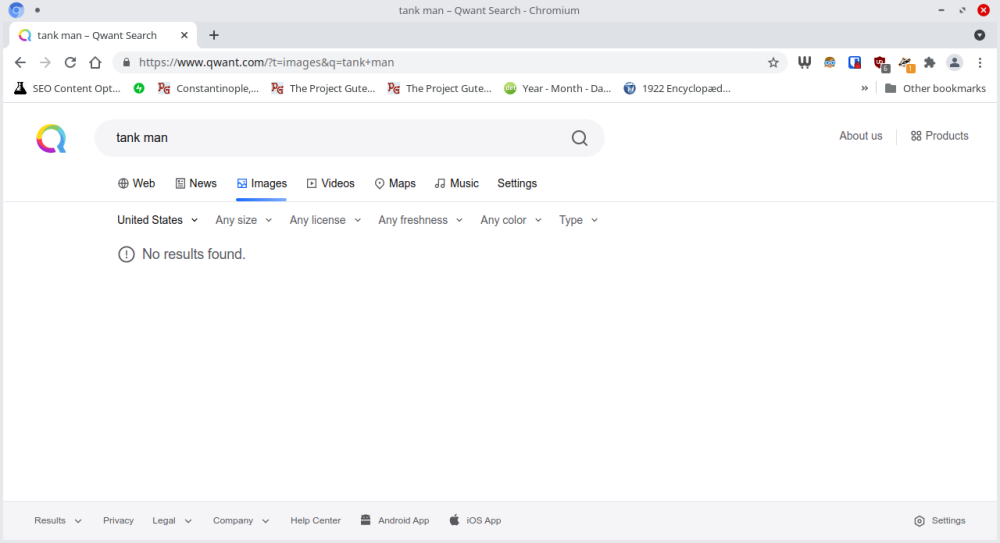
(Note: Peekier does not have image results, so there was nothing to test for.)
The Weakness of Most Alternative Search Engines
I recommend using quality privacy-friendly alternative search engines over big tech search engines for the reasons that I articulated in my Wutsearch review. However, the Tiananmen Square censorship uncovered a severe weakness in most of the alternative search engines – their reliance on big tech search engines.
I have seen many people who oppose big tech censorship tout DuckDuckGo as a strong alternative. DuckDuckGo has been my primary search engine for years, and it works well for that purpose. Using DuckDuckGo, at a minimum, allows one to see results outside the Google bubble that most internet-users around the world reside in. DuckDuckGo also does not deliver personalized results, owing to its lack of tracking. Furthermore, DuckDuckGo is not entirely coextensive with Bing. It does draw from other sources for various purposes, and I have noted that The New Leaf Journal receives much more recorded search traffic from DuckDuckGo than it does from Bing (small sample, but the difference is notable).
With that being said, while DuckDuckGo respects user privacy more than Google and Bing and is not controlled by Google or Bing, it is demonstrably not inherently censorship resistant. As the Tiananmen Square incident highlights, a search engine that relies on an external index is subject to the censorship decisions of that which it relies on. DuckDuckGo is very reliant on Bing for its search results, and it may in fact be exclusively reliant on Bing for its image search results. Qwant (a French search engine that is similar to DuckDuckGo), Swisscows (a family- and privacy-friendly Swiss search engine), and MetaGer (a German meta-search engine) are all subject to the same problem.
Steps for Alternative Search Engines to Take
This section concerns alternative search engines that are functionally meta-search engines, meaning they draw search results from other sources.
DuckDuckGo, Qwant, Swisscows, and MetaGer all have somewhat different aims and focus. But differences aside, they share a stated interest in user privacy. They are less expressly interested (in my estimation, at least) in the issue of censorship. Regarding DuckDuckGo, this is significant in light of the fact that many Americans use DuckDuckGo because they perceive it as an alternative to Google censorship.
I hope that these search engines – especially DuckDuckGo and Qwant – carefully assess their current vulnerabilities with respect to big tech censorship after Bing’s amoral capitulation to the Chinese Communist Party. The reports on Bing’s censorship all note that DuckDuckGo was affected, but only a few explain specifically why DuckDuckGo was affected. Many people who hold DuckDuckGo in some esteem due to the perception that it is resistant to censorship may come away from these stories with the impression that DuckDuckGo itself actively participated in the Chinese government censorship rather than passively acquiesced to it by virtue of its reliance upon Microsoft.
Qwant is, by its account, in the process of developing its own independent indexing capabilities. DuckDuckGo states that it draws from sources beyond Bing to inform its search results. I hope that both consider how they can make themselves less dependent on Bing.
The Importance of Independent Indexing Projects
Very few search engines have their own indexes. See this Search Engine Map for an illustration of how the search engines are related.
The map highlights that only five English-language search engines have their own indexing capabilities:
Google and Bing are the two largest search engines. Yandex is a Russian search engine, but it has a fully English-language version. Gigablast and Mojeek fall in the alternative search engine category.
Mojeek is included on the Wutsearch search engine launchpad. I recommended it as a search engine worth trying in my Wutsearch review. I have been impressed with Mojeek in my limited use of it, especially after it finally discovered The New leaf Journal in March. While I was examining the downstream effects of Bing’s censorship, I performed an image search for “tank man” in Mojeek.
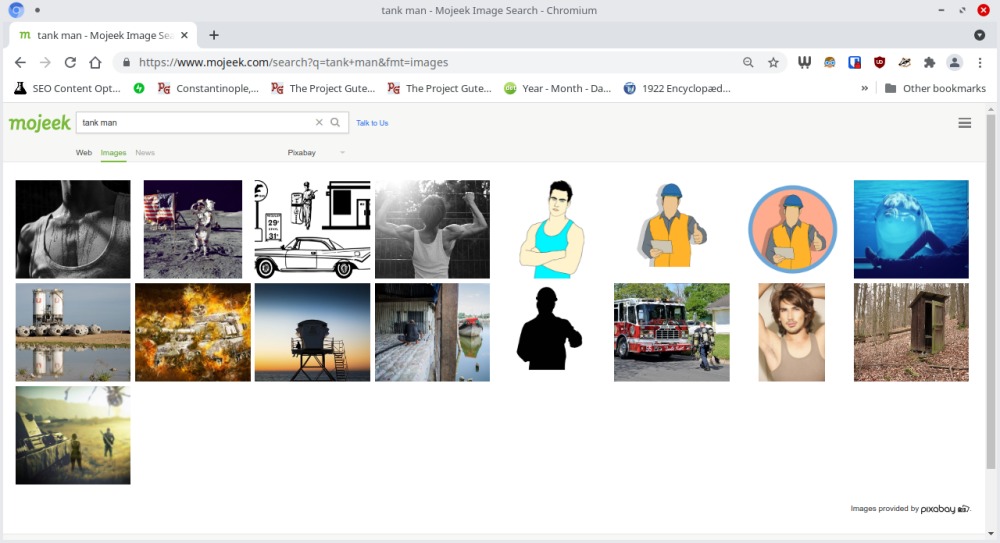
Sadly, Mojeek’s image search results are still drawn from Pixabay.
Mojeek may not be fully ready to use as an every-day search engine, but it is a very promising and improving project. The effects of Bing’s censorship highlight why it is a project very much worth supporting.
Gigablast has what I would describe as a very 1990s UI. Its official blog reveals that it has a specific interest in combating censorship. I have not used Gigablast much, but I will try it a bit in preparation for writing a comprehensive review of alternative search engines. It would be nice if it indexed our humble online magazine (my self-interest is speaking).
Finally, I will note that Brave, the company behind an innovative web browser, is also developing a search engine with an independent index. Consider this another project worth following.
What Can You Do?
Ideally, a search engine should respect user privacy, be censorship resistant, and return enough useful results for everyday use. Many of the alternative search engines check multiple boxes, but none is perfect. What is an informed search engine consumer to do? Below, I list some recommendations for people who do not want to rely on Google or Bing directly.
Understand Search Engine’s Position on Privacy
I am not an online privacy expert, nor do I pretend to be. Furthermore, what a company says in a privacy statement may be different than what is actually going on under the hood. With that being said, internet users who are interested in online privacy can study the privacy statements and publicly available information about various online tools, including search engines.
Understand Where Results Come From
With the exception of Mojeek and Gigablast, alternative U.S. search engines draw their results from other sources. Searchers who are concerned about censorship and search engine bias should be aware of from their search engine is deriving results. .
Avoid Bubbles
One reason that people may be inclined to leave Google or Bing is to avoid becoming stuck in a “search engine bubble.” Google and Bing deliver personalized search results based on user history, their algorithms, and their indexes. Using a variety of search sources helps users avoid a filter bubble. But one can still become stuck in a filter bubble by relying exclusively on any single alternative search engine. That is one reason I have recommended Wutsearch . Even if one does not use Wutsearch as an ordinary part of his or her workflow, the concept serves as a good reminder to rely on different sources.
Search Within Specific Trusted Sites
Google, Bing, DuckDuckGo, or any large search engine is not the means for answering every question. Site-specific search engines often offer what one needs. For example, I use AlternativeTo to discover new software and services. Because I find AlternativeTo useful, I created a search engine shortcut for it in my three primary web browsers – Ungoogled Chromium, FireDragon, and Falkon (see “Create a Search Shortcut for AlternativeTo” in the previous link). I discussed the process in some detail in my Wutsearch review (see “Is Wutsearch the Best Way to Juggle Multiple Search Engines”). DuckDuckGo users can replicate much of the same functionality with the search engine’s inbuilt bangs.
Consider Searx
Searx is an interesting metasearch engine. It is an entirely open source program that can combine results from numerous search engines in one place. Unlike most search engines, Searx is decentralized. That is, any person can host his or her own Searx instance. Self-hosting Searx instances is beyond the means of most regular internet users (me included), but there are numerous public Searx instances available. Searx instances vary in terms of security, included search engines, privacy, hosting country, and server response time.
Even more ambitious users can look into Yacy, a decentralized peer-to-peer search engine that I have not tried as of yet.
Conclusion
Bing’s applying Chinese censorship mores to international searches is a troubling development, and I hope that Bing comes up with a more compelling explanation of how and perhaps more importantly why it happened than “human error.” While it is unlikely that Microsoft will do so, this event should prompt it to reassess its relationship with the Chinese Government.
However, as someone who uses a variety of alternative search engines which rely, fully or in part, on Bing’s search index, the event served as a reminder of the limitations of alternative search engines so long as they rely on Google, Bing, Yandex, or other larger search engines for their search results. Bing’s actions affected a majority of the most popular alternative search engines and potentially damaged the free speech reputation of DuckDuckGo in the United States, but hopefully this will prompt well-intentioned alternative search engines to diversify their sources, especially in areas prone to big tech censorship, going forward.